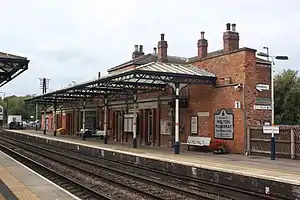Melton Mowbray railway station
Melton Mowbray railway station serves the market town of Melton Mowbray in Leicestershire, England. It is owned by Network Rail and operated by East Midlands Railway even though CrossCountry provide most of the services at the station.
 | |
| Location | Melton Mowbray, Borough of Melton England |
| Grid reference | SK752187 |
| Managed by | East Midlands Railway |
| Platforms | 2 |
| Other information | |
| Station code | MMO |
| Classification | DfT category E |
| History | |
| Original company | Midland Counties Railway |
| Pre-grouping | Midland Railway |
| Post-grouping | London, Midland and Scottish Railway |
| Key dates | |
| 1 September 1846 | First station opened as Melton |
| 1 May 1848 | Station resited |
| 1 November 1876 | Renamed Melton Mowbray |
| 1923 | Renamed Melton Mowbray South |
| 25 September 1950 | Renamed Melton Mowbray Midland |
| by 13 September 1957 | Renamed Melton Mowbray Town |
| 14 June 1965 | Renamed Melton Mowbray |
| Passengers | |
| 2015/16 | |
| 2016/17 | |
| 2017/18 | |
| 2018/19 | |
| 2019/20 | |
| Notes | |
Passenger statistics from the Office of Rail and Road | |
The railway station is on the (as built) Syston and Peterborough Railway, although the line is now part of the considerably longer Birmingham to Peterborough Line. CrossCountry operate the majority of services as part of their Birmingham to Stansted Airport route. The station lies between Leicester and Peterborough stations.
The station has a ticket office which is staffed part-time, a car park and help points for times where there are no staff present.
History
The station on the Syston and Peterborough Railway opened as Melton on 1 September 1846 when two sections were opened, the first from Leicester to Melton, and the second from Stamford to Peterborough. The section from Melton to Stamford had been delayed due to the opposition from Lord Harborough.[1]

The station building is thought to have been designed by William Parsons and Sancton Wood.[2] It was constructed by the contractor Herberts for a cost of £3,021 (equivalent to £294,700 in 2019).[3] The porte-cochère is an addition added later by the Midland Railway in an attempt to improve the station in response to the competition of the Great Northern and London and North Western Joint Railway who opened Melton North in 1879.
The station was badly damaged by a snowstorm on Tuesday 11 April 1876. The corrugated iron roof which spanned the two platforms and lines was about 60 yards (55 m) long and 28 yards (26 m) wide. The weight of snow caused the roof to collapse shortly after the passage of a goods train through the station. Fortunately there were no passengers on the platforms so there were no fatalities. A small section of the roof remained standing, but was in a poor condition so the company attached a long chain to it and, using a locomotive, pulled it down.[4] The line was cleared in around three hours.
On 1 November 1876 the station was renamed Melton Mowbray. In 1923 it was renamed Melton Mowbray South. From 1957 the station was known as Melton Mowbray Town to distinguish it from the former Melton Mowbray North on the Great Northern and London and North Western Joint Railway, which closed to regular traffic in 1953.
It was refurbished in 2011 with new glass in the platform canopies, resurfaced platforms, passenger information screens, improved disabled access to the barrow crossing, a full repaint and a new footbridge to replace the original which was superannuated. The refurbishment of the platforms retained their original size and means that previous plans to extend these by up to 14 yards (13 m) by no later than 2012[5] did not go ahead to the original timescale.
Stationmasters
- J. Withers ca. 1849 - 1850[6] (formerly station master at Syston, afterwards station master at Grantham)
- John Willis 1850 - 1862[7]
- George William Earp 1862 - 1864
- W. Barker 1864
- W. Butterfield from 1864
- Robert Jeffrey ca. 1869 - 1873[8]
- T.B. Symonds 1873 - 1878 (formerly station master of Berkley Road station, Gloucester, absconded after suspension on 28 November 1878)[9]
- Thomas Bedington 1878 - 1908[10]
- Lawrence Palmer Briggs 1908 - 1913[11] (afterwards station master at Trent)
- James Sparling 1913 - 1929[12] (formerly station master at Rowsley)
- Frederick Charles Robinson 1929 - 1940[13]
Services

From Melton Mowbray there is an hourly service off-peak in both directions operated by CrossCountry. Westbound, trains run to Birmingham via Leicester, Nuneaton and Coleshill. Eastbound, trains run to Stansted Airport via Peterborough, Ely and Cambridge. Additional trains run at peak times, with some terminating at Cambridge.[14]
Although the next station westbound is Syston, there are no direct services between the two stations.[14]
Despite managing the station, East Midlands Railway (EMR) only operates a limited number of services to the station. A single daily return service to London St Pancras commenced on 27 April 2009 running via Corby[15] and is notable for being the first regular passenger service to cross the spectacular and historic Welland Viaduct on the Oakham to Kettering line since 1966. The company introduced a further return service from Derby via East Midlands Parkway (for East Midlands Airport) from May 2010. Further services may be introduced in the future.[16] There are two daily services to/from London with one calling at Oakham, Corby, Kettering, Wellingborough, Bedford, and Luton. Whilst the other train calls at Oakham, Corby, Kettering, Wellingborough, Bedford, Luton and Luton Airport Parkway.[17]
In addition, a handful of local services operate at either end of the day (mainly for train crew route knowledge retention purposes). A morning service runs from Nottingham to Norwich and an evening service operates from Spalding to Nottingham via Peterborough.
| Preceding station | Following station | |||
|---|---|---|---|---|
| CrossCountry | ||||
| East Midlands Railway Nottingham - Norwich (via Loughborough) Limited Service | ||||
| East Midlands Railway Limited Service | ||||
| Terminus |
Former services
According to the Official Handbook of Stations the following classes of traffic were being handled at this station in 1956: G, P, F, L, H, C and there was a 7-ton crane. [18]
| Preceding station | Disused railways | Following station | ||
|---|---|---|---|---|
| Asfordby | Midland Railway Leicester London Road to Peterborough |
Saxby | ||
| Grimston | Midland Railway Nottingham Midland to Kettering |
Saxby | ||
| Terminus | Midland and Great Northern Joint Railway To Spalding, Kings Lynn, etc |
Saxby |
Just outside Melton Mowbray station the main line is joined by the Old Dalby Test Track. This runs towards Nottingham via Old Dalby, but stops short of Nottingham railway station at the edge of the suburb of West Bridgford. This is electrified with overheads, has its own control centre and dates from when the British Rail Research Division developed it as a test track for the Advanced Passenger Train, having been taken out of use some years before. It has, more recently, been used for testing Virgin Trains' Pendolino units and later for the testing of new stock for London Underground built by Derby Litchurch Lane Works.
Trivia
Railway station lavatories have never been noted for the luxury of their appointments, but the toilet of the former first class waiting room had a hot-water pipe coursing through the seat.[19]
Awards
Melton Mowbray station won "highly commended" award at the National Rail Awards 2014 for Small station of the year.[20]
References
- "Syston and Peterborough Line". Nottinghamshire Guardian. England. 4 September 1846. Retrieved 7 February 2021 – via British Newspaper Archive.
- "Syston and Peterborough Railway". The Leicestershire Historian. 1–2 (8): 2. 1967. Retrieved 7 February 2021.
- UK Retail Price Index inflation figures are based on data from Clark, Gregory (2017). "The Annual RPI and Average Earnings for Britain, 1209 to Present (New Series)". MeasuringWorth. Retrieved 2 February 2020.
- "Terrible Snowstorm and wreck of the Melton Mowbray Railway Station". Grantham Journal. England. 15 April 1876. Retrieved 7 February 2021 – via British Newspaper Archive.
- "Network Rail CP4 Delivery Plan 2009 Enhancements programme: statement of scope, outputs and milestones" (PDF). Network Rail. Archived from the original (PDF) on 7 June 2011. Retrieved 18 March 2010.
- "Melton Mowbray". Stamford Mercury. England. 28 June 1850. Retrieved 7 February 2021 – via British Newspaper Archive.
- "Melton Mowbray". Loughborough Monitor. England. 31 July 1862. Retrieved 7 February 2021 – via British Newspaper Archive.
- "Melton Mowbray". Stamford Mercury. England. 31 January 1873. Retrieved 7 February 2021 – via British Newspaper Archive.
- "Melton". Midland Railway Operating Traffic and Coaching Departments: 879. 1871–1879. Retrieved 7 February 2021.CS1 maint: date format (link)
- "Presentation to Mr Thomas Bedington". Grantham Journal. England. 12 December 1908. Retrieved 7 February 2021 – via British Newspaper Archive.
- "Midland Railway Appointments". Derbyshire Advertiser and Journal. England. 9 August 1913. Retrieved 7 February 2021 – via British Newspaper Archive.
- "Presentation to Councillor Sparling at Melton Mowbray". Grantham Journal. England. 6 July 1929. Retrieved 7 February 2021 – via British Newspaper Archive.
- "Retiring Stationmaster Dead". Market Harborough Advertiser and Midland Mail. England. 5 January 1940. Retrieved 7 February 2021 – via British Newspaper Archive.
- Table 47 National Rail timetable, May 2016
- "Passengers from Melton Mowbray set to benefit from direct link to London". www.eastmidlandstrains.co.uk. 7 April 2009.
- "Rail service could run north of town". Northants Evening Telegraph. 21 February 2008. Archived from the original on 16 January 2009. Retrieved 24 February 2008.
- Table 53 National Rail timetable, May 2016
- Official Handbook of Stations, British Transport Commission, 1956
- Lambert, A, (2010) Lambert's Railway Miscellany Ebury Publishing.
- "National Rail Awards Winners 2014". Archived from the original on 1 October 2014.
External links
| Wikimedia Commons has media related to Melton Mowbray railway station. |
- Train times and station information for Melton Mowbray railway station from National Rail